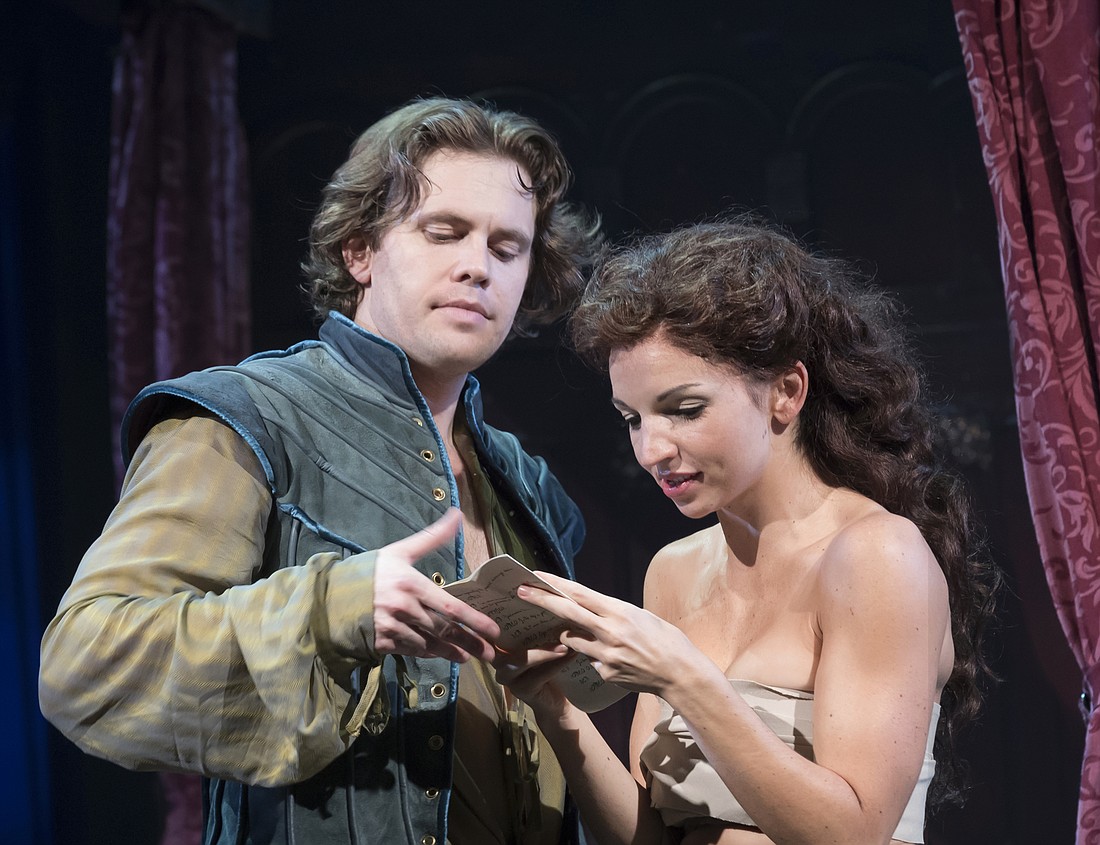- March 30, 2025
-
-
Loading

Loading

Shakespeare wrote blank verse — and his life was largely a blank slate.
Lee Hall’s “Shakespeare in Love” fills in the blanks of the Bard’s bare biography on the Asolo Repertory Theatre stage. It’s a stripped-down adaptation of Tom Stoppard and Marc Norman’s Academy Award-winning screenplay for the 1998 movie of the same name.
The year is 1593 and Shakespeare’s only 29. Sadly, the budding Bard has writer’s block. Happily, Shakespeare finds his muse in the form of the beautiful Viola (Laura Rook). He spies her at a lordly party. He unknowingly also spots her backstage. To circumvent Elizabethan laws prohibiting female actors, Viola disguises herself as a man, and sneaks into rehearsals for Shakespeare’s latest crowd-pleaser, “Romeo and Ethel’s the Pirate’s Daughter.” The talented Viola gets the part. Shakespeare gets the girl, but not for long. Her father promised (or sold) her hand in marriage to a thuggish aristocrat.
Love cures writer’s block. Shakespeare gets his groove back, and the pages flow. Thanks to his star-crossed romance with Viola, his light comedy about puckish pirates morphs into the tragedy of “Romeo and Juliet.”
The play’s the thing, and the play goes on. In an opening night substitution, Viola portrays Juliet. Shakespeare himself plays Romeo. Curtain falls, applause. Viola vanishes to Virginia. The heart-broken Bard weaves her cross-dressing expertise into his next play, “Twelfth Night.”
Like the screenplay that spawned it, this play is a love letter to language, love and the small, happy few of the theater world. Director Rachel Rockwell puts her heart and soul in it. She must’ve felt like singing, because she filled the play with song. It’s not a musical, but it wants to be. (Kudos also to music director and composer Neil Bartram for weaving song to story.)
It’s a large-cast production of first-rate actors. Here are a few highlights from the many fine performances:
Jordan Brown’s Shakespeare is a likable Everyman who just happens to be the greatest playwright of all time. Laura Rook’s Viola is a talented force of nature. She’s a great female actor living in an age when that’s a crime. Matt Mueller is winning and witty as Christopher “Kit” Marlowe, Shakespeare’s friend and rival playwright. (The Bard’s always cribbing lines from Kit. An inside joke for theater scholars who think Marlowe penned Shakespeare’s plays.) David Breitbarth is a hoot as Richard Burbage, the greatest canned ham of the Elizabethan era. As Viola’s betrothed, Brandon Dahlquist’s Wessex is the villain you love to hate. He’s marrying Viola for the dowry money and pushing her around until he seals the deal with a ring. After that, Viola’s financially motived fiancé plans to drag her to the savage land of Virginia. Queen Elizabeth is suitably icy and regal. (She wisely turns a blind eye to Viola’s gender crime.) Queen Bess also wants to see a cute dog. The dog appears—and bites Wessex on the ankle. (A doggie treat to Sting for his performance.)
Susan Mickey’s costumes fit the period, but don’t fit so tightly that the actors can’t move. (With the comic exception of the queen’s elaborate gown, which resembles a small circus tent.) Scott Davis’ revolving, two-tiered set is officially the Rose Theater. But it echoes the Globe Theatre — and the turning world itself. A magical play calls for magical lighting. Robert Wierzel delivers.
The result is spectacular, diverting, and ever so clever. The play aims for your heart, but doesn’t ignore your mind. This warm-hearted, improbable romance is always a lot of fun.
Is it historically accurate? Almost never.
A Shakespeare scholar I know of hoots and howls at the very title. “Romeo and Juliet” was stolen from two Italian plays! Marlowe didn’t talk like that. Or die like that. Marlowe wrote Shakespeare’s plays anyway!
But enow.
“Shakespeare in Love” has a sweet magic to it. Suspend your disbelief, and the magic will work.
And there’s an end on’t.